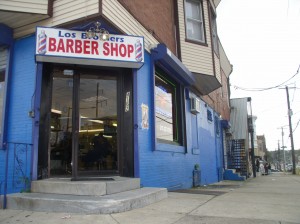

Los Brothers Barber Shop is just like ordinary barber shops…sort of.
The shop lies on the corner of Fifth and Hunting Park, rectangular in shape, like a box. It holds seven chairs, split on two adjacent walls, a barber manning each one. Clad in blue smocks, the barbers check their work in the mirrors that stretch from corner to corner.
So what’s the difference? Los Brothers is alive. Alive with business, with culture, with human interaction.
It’s 2 p.m. on a Saturday, a few clouds suspended in the sky. There are cars on the street, but the sidewalks are barren of life as I approach the shop. When I open the door, I step into a completely separate world. The music is blaring contagious sounds and is taking hold of everyone in the shop. A few people are moving to the beat, some are mouthing lyrics, and some are just tapping to themselves. But everyone is in the same zone and carrying conversation in the meantime.

I approach the first chair and explain my mission. Antonio Cruz, 28, listens, and then asks someone to come over to me. I think this is the owner, and re-establish who I am, and my mission, and ask if I can do interviews. I get the go ahead, but find out that “the owner” is a customer, Isaias Miniel, and my newfound translator.
Cruz found the spot empty a few months ago. “I’ve been here 6 months. I used to work around here, and the location has a lot of people I know,” Cruz says. This once-empty space is now booming with customers. “We get a lot of business. We’re high-class barbers,” Cruz says, or rather, he smiles while Miniel translates.
I find myself wanting to talk to other barbers, and Cruz refers me to a student in the back, David Montero. Montero, clad in a black-striped hooded sweatshirt, allows me to go about my business of interviewing, while simultaneously focusing on his client.
Montero, 19, came to Los Brothers two weeks prior, from another shop. He started cutting hair at age 16, and learned the trade by “messing people’s hair up,” he explains. “I had to wait for a chair to open, but the good thing about being a barber is you can get a job anywhere.”
Montero just recently came back to Philadelphia after attending the University of Rhode Island for a year, after his mother passed away and he inherited her home. He plans to continue cutting while attending the Community College of Philadelphia this January, studying to become a computer technician.
“I like it here because there are a lot of customers, and it’s fun. I’ve been to a lot of other shops, and this one is fun,” Montero says.
I thank Montero for his time and let him continue about his work. While I gather my notes, I start talking to Reinaldo Gibbs. Gibbs, sitting on the chair, getting his hair cut, spoke to me briefly when I first arrived.

“People here are more personable, and people in the United States aren’t like that. It’s hard to go throughout the day without making a friend. [The barbers] haven’t forgotten where they came from. There’s a warm feeling here,” Gibbs says.
And I feel that feeling. Mid- conversation, three young women come busting through the door, laughing and smiling. Wearing beautiful dresses, they walk from barber to barber, greeting them with kisses and idle chat. Just like that, they are gone. Just a simple passing through, just wanting to say hi.

Isaias Miniel picks up conversation while I gather my notes. “I like to come here to get my hair cut because they’re friendly. And it’s cheap.” Miniel has been a regular for three months. He and his cousin, Gibbs, used to go somewhere else, he explains. “It was dry. We were there for four months and nothing. It’s a whole different environment here.”
I finish up my work, and shake Antonio Cruz’s hand as a goodbye. I thank everyone for letting me eavesdrop, and leave the shop feeling a part of something. I think a quote from Reinaldo Gibbs, about Panama, explains it best.
“Like for us, we get homesick. This shop is out of my way, but I like to go here. It makes me miss home a little bit less.”


Be the first to comment